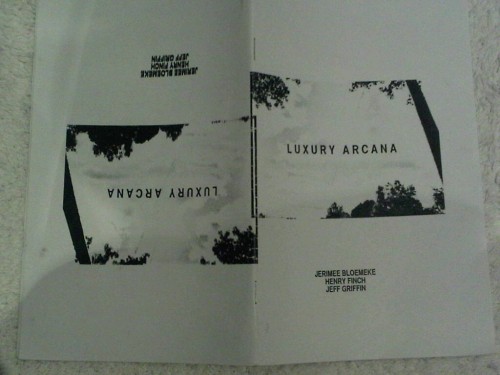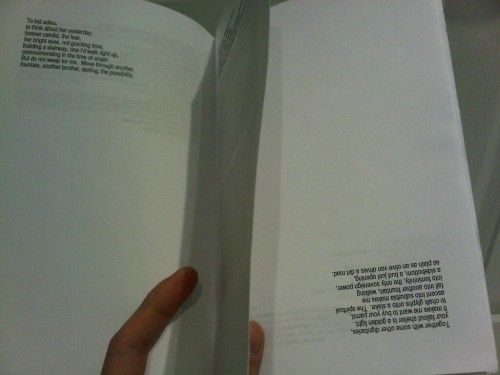Author Spotlight
those guys who want to be one guy: an interview with HUMAN 500
HUMAN 500 is Jerimee Bloemeke, Henry Finch, and Jeff Griffin — 3 poetry students at Iowa’s Writers’ Workshop. Their first release is a chapbook called Luxury Arcana, which was authored by the three of them, though not in the split-chapbook kind of way. It’s its own thing — a collaborative consciousness, fractured and polymorphous. It’s structured in sections, but the sections often differ in physical orientation (i.e. sections are upside down relative to each other), so the very act of left-to-right, front-to-back reading is not applicable or possible. There’s a number of ways to approach the construction and the poems themselves reflect what’s going on formally as they reference each other, repurpose lines and images, and are full of subtle discoveries. It’s a book that’s almost impossible to read the same way twice, one that I’ve returned to many times, and one that continually excites me in its exploration of collaboration, consciousness, and the physical space that a book occupies.
For a sense of the tone/affect, here’s one of my favorite pages:
This is the whole story. How she doesn’t look at me across the table. I stare at her sequence. I’d love it if she could get me some rows. Some beautiful beautiful rows.
Pigeons bust up and I nearly lose it. I fall up the stairs, one more tumble to make my point. She follows me and I’m telling her, You should go home with me. She’s looking at me now. I may be laughed at along the highway but not here. Let’s get lit and do drugs because as long as I hauled them here I’m going to give them to you like anthologies. It was torture spilling my drink while kissing you to ballads.
Trivial, selfish, frivolous. This is some really low motive, man. She returns with a full glass of whiskey and I’m thinking I need to hear some Lefty Frizzell and if that’s a dress she’s wearing I’m totally going to lose it.
For the interview, I emailed questions to Jerimee, Henry, and Jeff and they responded using the same collaborative process in which the book was written.
The first thing I noticed about this book, and what keeps me coming back to it (I think I’ve read it 5 times now), is that there is no clear way to physically read it. The front and back covers are identical, one being the upside down image of the other; and the book’s pages likewise rotate orientation throughout, so, no matter which cover you start at, at some point it will feel like you’re reading backwards.
I experimented with a few different ways of reading this – straight through from each cover, in sections, outside in – and each method revealed some new/different/cool aesthetic or formal decision I hadn’t noticed on previous reads. In a very literal sense, the book altered the way I read. It subverts the physical object of the book so the fundamental left-to-right action of reading is called into question. (Very cool.) My question, then, is: is there a “right way” to read this? How did you decide to format the book in this way?
There is no “right way” to read it. Though the pieces are paced and organized strategically throughout (as far as imagetext vs. texttext) we wanted there to be no prescribed order as far as a beginning or ending is concerned. Srikanth Reddy and Dan Beachy-Quick have a book of poems, Mobius Crown, that achieves this effect really well. And in a way, it is like Deleuze and Guattari’s theory of the rhizome: no beginning, no end, just all non-hierarchical MIDDLE. LUXURY ARCANA is like a coin in the way it is structured, at least on the outside, the outset. In rehab they have this phrase: KEEP COMING BACK. There are two ways into it, no way to ‘read’ it, and no way ‘out’ of it. We figured out a way to force a reader to turn the book around physically to orient the successive poems downside-up. The formatting arose from the three pairs of images in the book having one of two orientations.
Regardless of how you read it, one formal decision that’s apparent is the use of repeated images/phrases/lines throughout. I think the most noteworthy precedent of this technique would be Berrigan’s Sonnets, but, in that book, the repetition is the product of a single author and seems to suggest the permutability of a life or how stupid time is or something, however Luxury Arcana kind of demands to be considered differently because it’s the product of three authors, not one. It’s almost as if, reading the line “This is some really low motive, man” (for example) in consecutive poems, I’m witnessing different people have the same idea, as if this book were like a weird testament to “the convergence of experience” (I just made that up). Do you think that’s a fair way of interpreting the repetitive elements in the book? Could you talk about the repetition a little bit?
Your idea of the convergence of experience is apt in this case. The result: fragmentation and recombination of three selves by three selves. We took each other’s poems and fragmented, combined, recombined them into new poems. LUXURY ARCANA not only fragments the self, but fragments three of them. We could also think of this “convergence”, maybe paradoxically, as a fragmentation, a fragmentation of the self, along the lines of cubism, exposing the schizophrenic-like dimensions of what it is to be a single self. We wanted it to be unclear which of us wrote what, and even, as evidenced by our description of the book on our website, unclear as to what our process was, which we still feel explaining would be counterproductive if only because it is extremely convoluted. “Convergence of experience” is a totally “fair” way to interpret not only the repetitions in the book, but also the book as a whole. They occurred organically. Inevitably.
Along those lines… do you see this book as coming from a single voice, or three voices? (Or another number of voices?)
To the objective reader, and to us as we step back, the voice is one of a single yet fragmented, very strange, disturbed, beautiful maniac. We made an effort to keep the speaker singular, although the register changed often. Someone once referred to us as “those guys who want to be one guy” or something along those lines. In the case of LUXURY ARCANA, we think this is very accurate, though we didn’t set out with a finished result in mind.
Was any of this ever workshopped or discussed in an academic setting? If so, how did it go over? What did people say?
We were likely daydreaming about a girl or drunk or something. We was thinking, Hey, these poems were written by two other people. The response was positive, or, we don’t really remember. Some of the poems were workshopped, before the three of us edited them for the book, and the most striking comment went something like this: by attributing the poems to several authors, you’re avoiding responsibility for the content, or skirting responsibility. Someone said one poem looked like a tombstone. So some of them were, yes, or we don’t really remember.
What are/were the pleasures and difficulties of working collaboratively like this (if any)? I know this is a retarded question, but I’m nonetheless curious to see what you’re answer will be.
It was and continues to be all about pleasure. Collaborating this way made us into a sieve for words, sharing material in real time and moving through the space of the cemetery more quickly than if we were alone. So maybe we’re saying there are no difficulties working together.
How deep does the “convergence” run with you guys – do you read similar stuff? Are you guys in classes together? Do you share poems outside of collaborative projects? Have similar interests outside of poetry?
Geographically, we come from different places: Florida, Nevada, North Carolina. We read a bunch of different things: novels, philosophy, Marxist and anarchist theory, Jon Leon, musician and artist interviews, Tiqqun, as well as, you know, poetry. We were in a seminar together, taught by James Galvin here at the Writers’ Workshop, when we were working on LUXURY ARCANA. The central text of the seminar was The Changing Light at Sandover, which we were perhaps subconsciously influenced by. Outside of poetry, we’re interested in pointless adventures having a point, yelling out of car windows at pedestrians, and generally being fuck-ups. We eat together. We drink together. Sometimes we take off my boots in class because it feels good. Like a Venn diagram. But not constantly.
What’s next? Are you guys going to keep collaborating until we all die? Does HUMAN 500 have any future releases/projects planned?
We’ve been concentrating on our own work recently. We are always looking for the next language prison. So perhaps a sequel to LUXURY ARCANA is on the horizon. We have recently released Jeff’s book, THERE’S NEVER BEEN A DAY THAT DIDN’T REQUIRE KNIVES LIKE THESE (Jeff reading), Jerimee has two completed books awaiting releases called, respectively, SUICIDE NOTES and ABCDEFGHIJKLMNOPQRSTUVWXYZ (Jerimee reading), and Henry is editing a series of poems called NEW MUSIC, a kind of self-erasure, and another series of poems called WESTERN VILLAGE written using a deck of playing cards from a casino. We’d also like to release books by our female colleagues and friends. No one is going to die.
Tags: human500, iowa, luxury arcana




Cool idea
ditto
Also worth noting: the collaborative poems of Kathleen Rooney and Elisa Gabbert.
i was just thinking today that i’ve never ready a good collab. i mean i’ve read passable collabs, but it’s totally unfathomable to me that a collaboratively written book could possibly be one of my favorite books. so this is totally interesting to me. like, maybe it’s an issue of commitment, and maybe these dudes have the commitment to make a collaboration be a front-burner type project.
[pedantry alert]
Collaborations work well enough when cultural context and authorial psychologies conspire in their favor:
Homer
Old Testament
New Testament
Fletcher/Beaumont; Fletcher/Shakespeare
The Waste Land (in a way)
Hem/Perkins; Wolfe/Perkins (each in a way)
Carverlish
There is architecture, there is much musical collaboration, there are Renaissance painting studio/factories.
The Romantic paradigm of a person creating ‘alone’ from the independence of one’s private experience is sometimes trustworthy, sometimes not at all.
I’ve been meaning and neglecting to write something about LUXURY ARCANA since I got it, it’s excellent shit. Excited about all the new releases too. This interview is great.
if we’re talking collabs, “Nice Hat. Thanks.” cannot not be mentioned
http://www.wavepoetry.com/catalog/22-nice-hat-thanks-
if we’re talking collabs, “Nice Hat. Thanks.” cannot not be mentioned
http://www.wavepoetry.com/catalog/22-nice-hat-thanks-
(deleuze&guattari&horkheimer&adorno notwithstanding, i’m talkin postwar ‘literature’ here)
buy the book.
buy the book.
subtle!
i think i probably will, but i live in argentina right now and int’l shipping’s a huge huge hassle.
the way they answered the questions reminded me of ‘neverending story’. want to read this, good job you guys. (http://youtu.be/-jogNJd5azg)
Human 500 + HTMLGIANT = Human Giant
http://xrl.us/bh8tjk
http://xrl.us/bh8tjk
[…] Jerimee Bloemeke and Henry Fitch, in an early issue of LIES/ISLE. I became a dedicated fan of Human 500, Griffin & Bloemeke & Finch’s press, purchasing everything they put […]